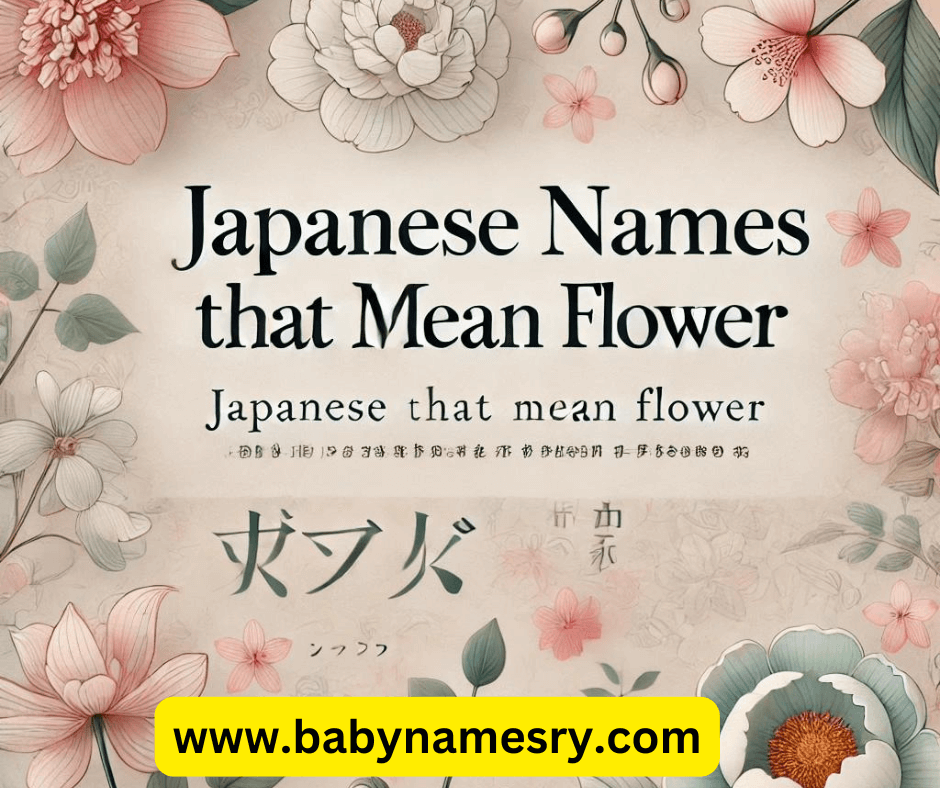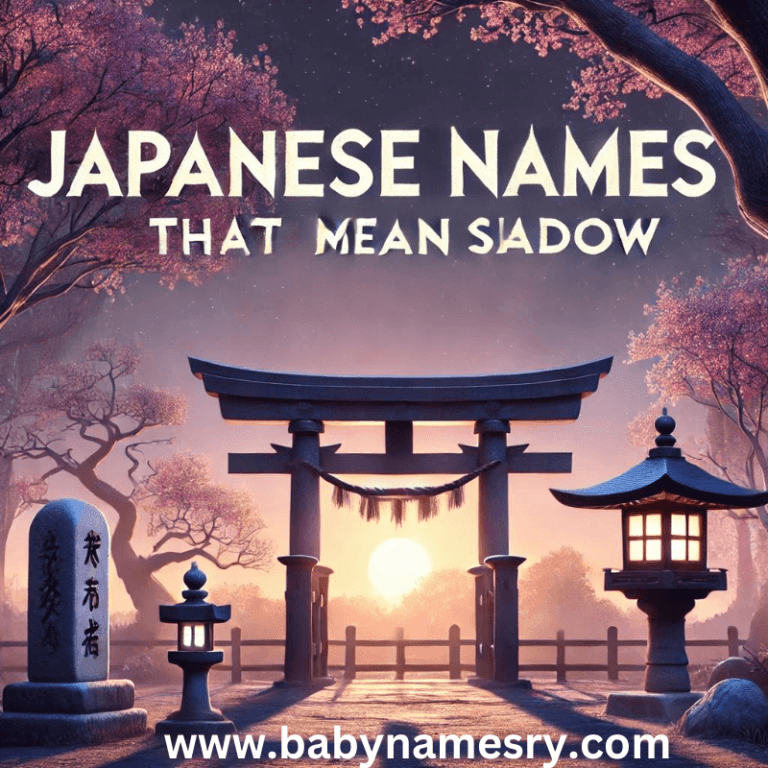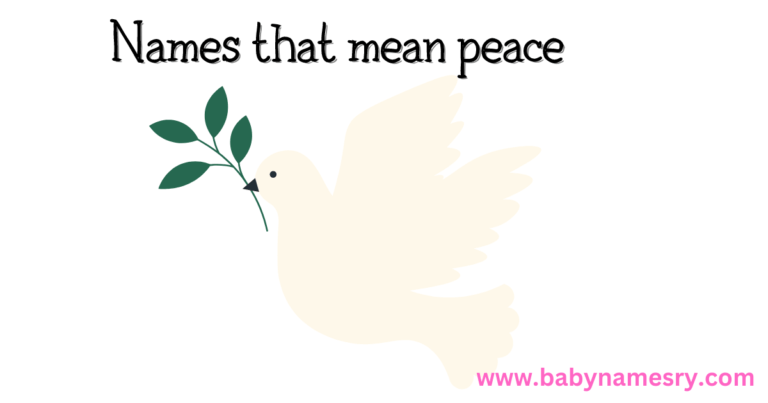75+ Japanese Names That Mean Flower: Big in 2025

Are you looking for Japanese names that mean flower? You at the right place.
In Japan, flowers hold deep cultural significance, symbolizing beauty, growth, and the changing seasons. Whether you’re seeking a name that reflects the elegance of nature or a symbolic meaning, Japanese flower names offer a timeless, graceful option. These names not only reflect nature’s beauty but also carry cultural richness.
Let’s dive into some of the most beautiful Japanese names that mean flower and explore their origins and meanings.
Japanese Boy Names That Mean Flower
- Hanaichi (花一)
Meaning: One flower
Origin: Japanese
“花” (Hana) means flower, and “一” (Ichi) means one. It symbolizes uniqueness, like a single blooming flower. - Ren (蓮)
Meaning: Lotus
Origin: Japanese
Ren refers to the “蓮” (Lotus), a flower that symbolizes purity and spiritual resilience in Japanese culture. - Yukio (雪花男)
Meaning: Snow flower
Origin: Japanese
“雪” (Yuki) means snow, and “花” (Hana) means flower. Combined with “男” (o), meaning male, it evokes a snowy flower’s delicate beauty. - Hinata (日向)
Meaning: Sunflower
Origin: Japanese
“日向” (Hinata) means facing the sun, much like a sunflower. It symbolizes positivity and warmth. - Haruka (春花)
Meaning: Spring flower
Origin: Japanese
“春” (Haru) means spring, and “花” (Hana) means flower, symbolizing renewal and new beginnings. - Kikuo (菊男)
Meaning: Chrysanthemum man
Origin: Japanese
“菊” (Kiku) refers to the chrysanthemum, Japan’s national flower, symbolizing longevity and nobility, with “男” (o) meaning male. - Kaoru (薫)
Meaning: Fragrant flower
Origin: Japanese
“薫” (Kaoru) refers to a fragrant flower, carrying soft and gentle connotations of a sweet scent. - Shun (俊)
Meaning: Blossom
Origin: Japanese
“俊” (Shun) means excellence or blossoming, a name full of potential and promise. - Tsubaki (椿)
Meaning: Camellia
Origin: Japanese
“椿” (Tsubaki) is the camellia flower, symbolizing love and devotion. - Ayame (菖蒲)
Meaning: Iris flower
Origin: Japanese
“菖蒲” (Ayame) means iris, a flower often associated with bravery. - Akira (明花)
Meaning: Bright flower
Origin: Japanese
“明” (Akira) means bright, symbolizing a flower in full bloom. - Saku (咲く)
Meaning: To blossom
Origin: Japanese
“咲” (Saku) means to bloom or blossom, signifying growth and vitality. - Takashi (高志花)
Meaning: Noble flower
Origin: Japanese
“高” (Taka) means noble, and “花” (Hana) refers to a flower, creating a name symbolizing grace and strength. - Aoi (葵)
Meaning: Hollyhock
Origin: Japanese
“葵” (Aoi) refers to the hollyhock flower, representing devotion and love. - Nao (直花)
Meaning: Honest flower
Origin: Japanese
“直” (Nao) means honest or straightforward, combined with “花” (Hana), representing purity.
Read More: Boy Names That Start With A and End With Letter A
Japanese Girl Names That Mean Flower
- Sakura (桜)
Meaning: Cherry blossom
Origin: Japanese
“桜” (Sakura) refers to the famous cherry blossom, symbolizing the beauty and transience of life. - Hana (花)
Meaning: Flower
Origin: Japanese
“花” (Hana) simply means flower, representing beauty and elegance. - Yuri (百合)
Meaning: Lily
Origin: Japanese
“百合” (Yuri) refers to the lily flower, symbolizing purity and innocence. - Ayaka (彩花)
Meaning: Colorful flower
Origin: Japanese
“彩” (Aya) means colorful, and “花” (Hana) means flower, creating a vibrant, lively name. - Hinagiku (雛菊)
Meaning: Daisy
Origin: Japanese
“雛菊” (Hinagiku) means daisy, a flower symbolizing purity. - Tsubaki (椿)
Meaning: Camellia
Origin: Japanese
“椿” (Tsubaki) refers to the camellia flower, representing love and devotion. - Botan (牡丹)
Meaning: Peony
Origin: Japanese
“牡丹” (Botan) refers to the peony flower, symbolizing honor and bravery. - Suzu (鈴蘭)
Meaning: Bell flower
Origin: Japanese
“鈴” (Suzu) means bell, and “蘭” (Ran) refers to a type of flower, together symbolizing beauty and grace. - Kaede (楓)
Meaning: Maple flower
Origin: Japanese
“楓” (Kaede) refers to the maple tree, symbolizing transformation and beauty. - Sumire (菫)
Meaning: Violet flower
Origin: Japanese
“菫” (Sumire) means violet, symbolizing modesty and sincerity. - Azami (薊)
Meaning: Thistle flower
Origin: Japanese
“薊” (Azami) refers to the thistle flower, symbolizing strength and resilience. - Ume (梅)
Meaning: Plum blossom
Origin: Japanese
“梅” (Ume) means plum blossom, symbolizing perseverance. - Himawari (向日葵)
Meaning: Sunflower
Origin: Japanese
“向日葵” (Himawari) means sunflower, symbolizing positivity and warmth. - Ran (蘭)
Meaning: Orchid
Origin: Japanese
“蘭” (Ran) refers to the orchid, a flower symbolizing refinement and beauty. - Fuji (藤)
Meaning: Wisteria
Origin: Japanese
“藤” (Fuji) refers to the wisteria flower, symbolizing longevity and endurance.
You May Like: 30+ Names That Mean Foolish
Gender-Neutral Japanese Names That Mean Flower
- Asahi (旭花)
Meaning: Morning sun flower
Origin: Japanese
Asahi combines “旭” (morning sun) and “花” (flower), symbolizing a fresh start, making it perfect for any gender. - Kikka (菊花)
Meaning: Chrysanthemum flower
Origin: Japanese
Kikka means chrysanthemum, a flower representing longevity and nobility, ideal for a strong unisex name. - Nozomi (望)
Meaning: Hope flower
Origin: Japanese
Nozomi carries the meaning of hope, like a flower blooming with possibility, suitable for any gender. - Koharu (小春)
Meaning: Small flower of spring
Origin: Japanese
Koharu, meaning “small spring flower,” is a gentle and serene unisex name, symbolizing renewal. - Sugi (杉)
Meaning: Cedar flower
Origin: Japanese
Sugi refers to the cedar tree and its blossoms, symbolizing strength and endurance, making it a strong, nature-inspired unisex name. - Misaki (美咲)
Meaning: Beautiful blossom
Origin: Japanese
Misaki means “beautiful blossom,” representing elegance and grace in any child, regardless of gender. - Hikari (光花)
Meaning: Light flower
Origin: Japanese
Hikari combines “光” (light) and “花” (flower), signifying brightness and beauty, a radiant choice for any gender. - Natsu (夏花)
Meaning: Summer flower
Origin: Japanese
Natsu represents the vibrant energy of summer blooms, making it a lively, gender-neutral option. - Yuzuki (柚月)
Meaning: Citrus moon flower
Origin: Japanese
Yuzuki combines “柚” (citrus) and “月” (moon), evoking a serene, nature-inspired name that suits any gender. - Kanon (花音)
Meaning: Flower sound
Origin: Japanese
Kanon symbolizes the gentle, harmonious sound of blooming flowers, a soft and peaceful name for any child. - Hoshiko (星子)
Meaning: Star flower child
Origin: Japanese
Hoshiko brings together “星” (star) and “花” (flower), creating an ethereal, gender-neutral name linked to the cosmos. - Akemi (明美)
Meaning: Bright and beautiful flower
Origin: Japanese
Akemi reflects beauty and brightness, combining both qualities of a radiant flower, a fitting name for any child. - Shiori (詩織)
Meaning: Poetic flower
Origin: Japanese
Shiori means “woven poetry,” symbolizing delicate beauty like a flower, a gentle unisex name with depth. - Yua (結愛)
Meaning: Binding love like a flower
Origin: Japanese
Yua symbolizes love tied with nature, reflecting the bond of a flower and its beauty, making it a tender unisex name. - Ichika (一花)
Meaning: One flower
Origin: Japanese
Ichika means “one flower,” signifying simplicity and uniqueness, a minimalist and unisex choice.
Don’t Miss: Names That Mean Absent: Trending in 2025
Final Thoughts
Japanese flower names carry beautiful meanings and deep cultural significance. Whether you are looking for a name that symbolizes beauty, strength, or purity, there’s a perfect Japanese flower name for your little one.
Looking for more unique names? Explore our other name lists and discover even more beautiful and meaningful choices!
FAQs: Japanese Names That Mean Flower
Q: What are some Japanese names that mean flower?
Japanese names that mean flower or are associated with flowers include Hana (花), meaning “flower”; Sakura (桜), meaning “cherry blossom”; Ayame (菖蒲), meaning “iris”; Yuri (百合), meaning “lily”; Botan (牡丹), meaning “peony”; Tsubaki (椿), meaning “camellia”; Sumire (菫), meaning “violet”; Kiku (菊), meaning “chrysanthemum”; Ume (梅), meaning “plum blossom”; and Ren (蓮), meaning “lotus.”
Q: Which Japanese names combine ‘flower’ with other meanings?
Japanese names that combine “flower” with other meanings include Hanako (花子), meaning “flower child”; Hanami (花見), meaning “flower viewing”; Hanayo (花世), meaning “world of flowers”; Sakurako (桜子), meaning “cherry blossom child”; Hinagiku (雛菊), meaning “daisy”; Momohana (桃花), meaning “peach blossom”; and Hanari (花梨), meaning “flower and pear.”
Q: What are some unisex Japanese names related to flowers?
Unisex Japanese names related to flowers include Ren, meaning “lotus”; Hinata (向日葵), meaning “sunflower” or “facing the sun”; Kaede (楓), meaning “maple flower”; Aoi (葵), meaning “hollyhock”; and Nao (菜生), meaning “wildflower.”
Q: Are there any modern Japanese names inspired by flowers?
Modern Japanese names inspired by flowers include Rinka (凛花), meaning “dignified flower”; Himari (陽葵), meaning “sunflower”; Sana (咲菜), meaning “blossoming greens”; Haruka (遥花), meaning “distant flower”; and Meika (芽花), meaning “budding flower.”
Q: What are some poetic or elegant Japanese names meaning flower?
Poetic or elegant Japanese names meaning flower include Souta (蒼太), meaning “flower of the blue sky”; Fuyuka (冬花), meaning “winter flower”; Mizuki (美月), meaning “beautiful moon and flower”; Kazahana (風花), meaning “wind-blown flower”; and Yukika (雪花), meaning “snow flower.”
Related Articles
Names That Mean Shark
Names That Mean Toxic
Japanese Names That Mean Light
Japanese Names That Mean Sun






